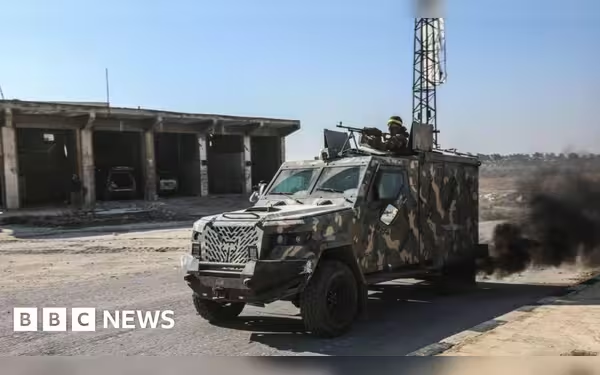Sunday, December 22, 2024 02:53 PM
Syria Rebels Launch Offensive, Capture Territory in Idlib and Aleppo
- Rebels gain ground in north-west Syria after years of conflict.
- Civilian casualties rise due to air strikes in opposition areas.
- HTS aims to deter Syrian government aggression amid regional tensions.
 Image Credits: bbc
Image Credits: bbcSyria rebels launch a major offensive, capturing territory in Idlib and Aleppo, escalating violence and civilian casualties amid ongoing conflict.
The ongoing conflict in Syria has taken a dramatic turn as rebel forces have launched a significant offensive in the north-western region of the country. This marks the first time in years that these groups have successfully captured territory from President Bashar al-Assad’s forces. The Islamist militant group Hayat Tahrir al-Sham (HTS), along with allied factions, has reported seizing control of several towns and villages in the Aleppo and Idlib provinces since the offensive began on Wednesday.
The Syrian military has responded by stating that its forces are facing a "large-scale" attack from what they describe as "terrorists," claiming to inflict heavy losses on the opposing side. According to a UK-based monitoring group, the fighting has resulted in the deaths of over 180 combatants from both sides. Tragically, at least 19 civilians have also lost their lives due to air strikes conducted by Syrian and Russian forces targeting opposition-held areas.
The civil war in Syria, which erupted in 2011 following a violent crackdown on peaceful pro-democracy protests, has claimed more than half a million lives. Idlib province remains the last significant stronghold for opposition forces, housing over 4 million people, many of whom have been displaced and are living in dire conditions. While HTS predominantly controls this enclave, Turkish-backed rebel factions and Turkish forces are also present.
In 2020, a ceasefire brokered by Turkey and Russia aimed to halt the Syrian government's attempts to retake Idlib, leading to a temporary reduction in violence. However, sporadic clashes, air strikes, and shelling have persisted. Recently, the UN special envoy for Syria expressed concerns that conflicts in neighboring regions, such as Gaza and Lebanon, are exacerbating tensions in north-west Syria.
HTS and its allies have stated that their offensive aims to "deter aggression" and "thwart the enemy’s plans," accusing the Syrian government and Iran-backed militias of escalating hostilities in the region. This offensive comes at a time when the Syrian government and its allies are preoccupied with other conflicts, particularly in Lebanon, where an Israeli military campaign has severely impacted the Iran-backed Hezbollah movement.
By the end of the first day of the offensive, rebel forces had made significant advances, reportedly coming within 10 kilometers of Aleppo city. They have taken control of the Syrian army's 46th Regiment base and several villages. The monitoring group also reported that the rebels have cut off the M5 highway, a crucial route between Aleppo and the capital, Damascus.
In the past two days, the fighting has resulted in the deaths of 121 rebels, primarily from HTS, along with 40 government troops and 21 militiamen. The rebels claimed to have captured the town of Khan al-Assal, located just 5 kilometers from Aleppo city, and reported killing over 200 members of pro-government forces. In contrast, the Syrian military has stated that it is actively confronting the ongoing "terrorist attack" with various weapons, although it did not disclose any losses among its own forces.
Meanwhile, the Syria Civil Defence, known as the White Helmets, reported that air strikes by Syrian and Russian warplanes have targeted residential areas in the opposition-controlled town of Atareb, resulting in the deaths of 14 civilians, including children and women. The UN’s Deputy Regional Humanitarian Coordinator for Syria expressed deep concern over the escalating violence and its impact on civilians, highlighting that nearly 7,000 families have been displaced and essential services have been disrupted.
As the situation continues to evolve, the international community watches closely, hoping for a resolution to the conflict that has caused immense suffering. The call for an "immediate de-escalation" resonates louder than ever, as the protection of civilians and humanitarian operations remains a pressing concern amidst the chaos of war.













